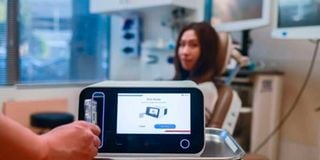Portable gadget that can detect gonorrhoea in less than 20 minutes

Sensor chip that detects six common sexually transmitted infections.
What you need to know:
- The scientists from the US presented the portable device at this year’s Grand Challenges Annual Meeting in Dakar, Senegal.
- It can diagnose chlamydia, gonorrhoea, trichomoniasis, Mycoplasma genitalium, antibiotic-resistant gonorrhoea and antibiotic-resistant Mycoplasma genitalium.
Scientists have developed the world’s first sensor chip that can detect sexually transmitted infections in either vaginal swabs or first-void penile urine in less than 20 minutes.
The scientists from the US presented the portable device at this year’s Grand Challenges Annual Meeting in Dakar, Senegal. It can diagnose chlamydia, gonorrhoea, trichomoniasis, Mycoplasma genitalium, antibiotic-resistant gonorrhoea and antibiotic-resistant Mycoplasma genitalium
This comes after in April this year scientists at the Kenya Medical Research Institute (Kemri) found two new mutations they have never seen before in genes associated with gonorrhoea and chlamydia in the country. The discovery came as investigators sought to understand why two hospitals in Busia County, which borders Uganda, were recording rising cases of STIs.
According to Prof Samson Muuo, the assistant principal research scientist at the Center for Microbiology Research at Kemri, they were then shocked to find that all the 424 Kenyan women aged 15 years and above sampled from two public hospitals tested positive for gonorrhoea and chlamydia.
“The two new mutations we identified in MtrR and 23S rRNA genes associated with macrolide resistance were not from a common ancestral origin from the previous reported one. Busia being a border town gives an interesting approach about the disease’s spread. Hypothetically, it can be assumed that these mutations will spread between the two regions,” he explained, adding that macrolides are a class of drugs used to manage and treat various bacterial infections.
Speaking to Healthy Nation in Dakar, Elaine Ng, a scientist from MagIC Lifescience based in California, explained that physicians lack a way to provide immediate treatment for curable bacterial STIs and therefore delay treatment or treat empirically, which is often inappropriate.
“Physicians currently have to send patient specimens to labs then wait for results and sometimes patients have to wait for many days.
“As you may know, Point-of-Care (POC) testing is an invaluable resource in many clinical settings, especially in remote, low resource, low income settings, and low- and middle-income countries. Current available laboratory tests remain cost-prohibitive, inaccessible and require trained and skilled operators to run and this is why MagIC Lifescience is providing an affordable, easy-to-use and ultra-fast POC diagnostic solution for clinical applications,” she explained.
She highlighted that they are leveraging on giant magneto-resistance (GMR) to advance molecular diagnostics. “Our GMR biosensors are the magic behind ultra-high sensitivity and multiplex capabilities.
According to the expert, the sensors can simultaneously test for the STIs in less than 20 minutes using vaginal, rectal and oral swabs as well as urine samples.
“The sensor provides comprehensive results that will expedite treatment of patients, decrease inappropriate use of antibiotics and prevent issues related to follow-up.
“The core technology behind the MagChipR Platform GMR biosensors are magnetic-based field sensors that provide several advantages over conventional fluorescent and optical-based detection methods. They offer lower background noise and a higher signal-to-noise ratio due to sample matrix insensitivity,”she highlighted.
Additionally, GMR biosensors do not need complex and expensive components for signal readout and processing or light compensation that are required for more traditional methods. “Therefore, our analyser can be made truly point-of-care, portable, affordable, and accessible by reducing footprint and cost while maintaining a simple user workflow for untrained operators,” the scientist assured while reminding that earlier and better triage and treatment decisions lead to definitive, resistance-guided, and expedited partner therapies which reduce transmission, reinfection, and adverse reproductive health complications.





